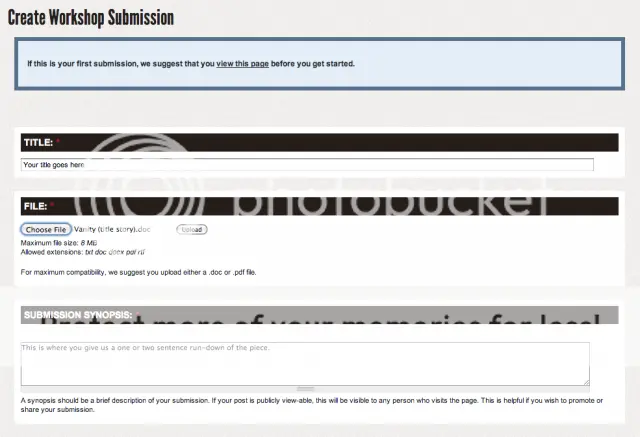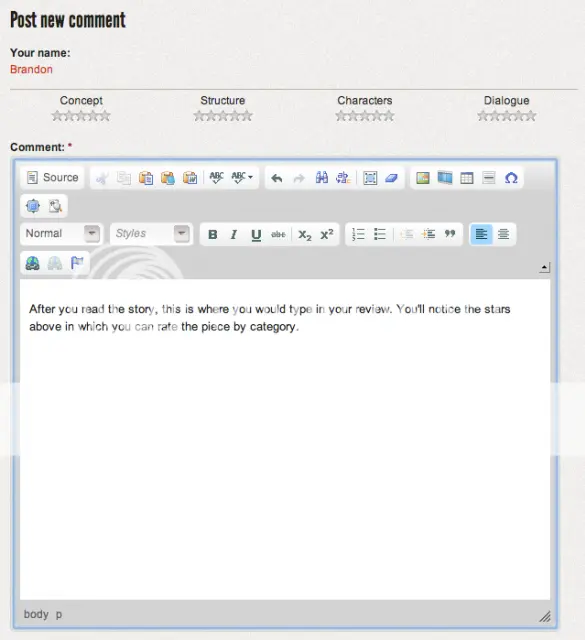Seems like every week I see a new thread open up in our discussion forum regarding our writer's workshop—typically, asking the same questions to the tune of “how does it work?” and “what kind of stuff can I submit?” It’s not like shopping for an apartment where you can take a look at our reviewing system and how feedback is structured before you make the monetary commitment. So this column is for you, the aspiring authors, the ones looking to take it to the next level who aren’t sure if they’re ready to invest. If you’re on the fence or need a few questions answered before making your decision, hopefully, we can address all that right here.
Let’s start with the big one: Does this system actually work?
The short answer is a resounding yes. If you join and actively apply yourself, there’s no possible way that you won’t get better. Writers get carved into authors; first drafts turn into published pieces; the people coming in with blank resumes build their credentials. I’ve seen it happen like clockwork for years.
Still too broad? In 2009 (back when our workshop was hosted over at ChuckPalahniuk.net), the only thing I came in with was a self-published book. Fast-forward to now, I’ve got a two-book deal with a traditional publisher, numerous online and print anthology credits, a New York literary agent repping my third book, and one of my original workshop submissions is going to be featured in Burnt Tongues, the Chuck Palahniuk anthology, which comes out this August through Medallion Press. And the other nineteen authors featured in that anthology…they too were workshop members. Many of them have gone on to publish novels of their own and obtain representation.
Richard Thomas, a workshop grandmaster, now runs his own publishing imprint, Dark House Press.
Rob Hart, the class director here at LitReactor, also started off in the workshop–and his first novel, New Yorked, just got picked up by Exhibit A Books, the crime fiction imprint of Angry Robot.
We brought the creativity and the drive, but the workshop gave our writing a place to be honed. So does the system work? You bet your ass it does; it’s been working for years.
Workshop At-A-Glance:
So now that you know that success is possible, let’s field the FAQs.
How much does it cost? $9 per month or $45 for six months; if you honestly want to see results, my personal recommendation is you stick with this for at least a year.
What is the points system? It breaks down as such: submitting a piece to the workshop = 15 points. You’re actually gifted 15 points when you join, so feel free to fire away once you get in. After that, points must be earned through reviewing other submissions. A ‘helpful’ review = 2; a ‘very helpful’ review = 3; a ‘not helpful’ review = 0.
What types of submissions can I make? Pretty much anything: novel excerpts, poems, short stories, flash fiction, screenplays. I’ve even seen some school-related pieces crop up a few times. Of course, short stories and flash fiction have always been the bread and butter of the workshop.
Are my submissions considered published? Absolutely not. Our workshop is a private venue, and therefore, only viewable by other members of the writers’ workshop.
Who is going to review my submission? Other workshoppers. Some of them will be beginners. Others will have some publications under their belt. Collectively, the people who are looking at your work will be just like you: writers trying to improve their craft. You’re among friends.
How many reviews will I get? It depends. I’ve seen some pieces get over twenty. Others I’ve seen have only gotten a few. I will say the submissions that get the most attention are typically on the shorter side, have an interesting premise, or maybe even stir up a little controversy.

What’s a synopsis? A one or two-sentence breakdown of what your story is about, also known as an elevator pitch.
What is the author’s agenda? Essentially, this is the field where you put in two things: what you’re attempting to do and what your areas of concern are. This is you telling potential reviewers, “I need you to look at such-and-such,” so make use of it. If you don’t bring it up, it’s possible it won’t be addressed.
What’s the difference between a ‘helpful’ review and a ‘very helpful’ review? ‘Helpful’ means the reviewer addressed all the areas of concern that you brought up in your author’s agenda; ‘very helpful’ means they went above and beyond the call of duty.
What’s the deal with the star ratings? It is an at-a-glance indication of how strong the piece is. Although we generally try not to read into them too much, a good rule of thumb is that anything four stars or higher is probably almost ready for publication.

In-Depth Workshopping:
I really want to get the most out of my submissions; how do I do that? The piece should be as polished as you can possibly make it on your own. That means (at the very least) checking your spelling, your grammar, and your formatting. Generally, we like to see 12 pt. font, Times New Roman, 1” margins, .doc file type. Your synopsis and your agenda should be clear, concise, and compelling. Doing these things will ensure your reviews are specific to your core concerns, not the little grammar flubs and whatnot that you should have caught in the first place.
How long should my submission be? Somewhere between 1,500 – 3,000 words is the sweet spot. Of course, flash fiction tends to get the most attention because reviewers know it’s not going to take as long to review, therefore, they’re scoring points easier. You can submit longer pieces, but keep in mind that you’re asking more of the reviewer by doing this. Some people aren’t going to want to invest the time unless the premise is kick-ass or they’re not grabbed by the writing within the first page or two. Your work can be any length of your choosing, but shorter pieces generally yield more reviews. On a related note, I did see a guy submit his entire manuscript once. Never ever do that. It’s a waste of points.
But what if I have a novel I want to workshop? You can, but there are some conditions you need to abide by—the first being that you never ever EVER submit the whole damn thing in one submission. No one is going to critique a 60,000+ word novel for three measly points. The best approach is to break it up into small chunks and do it that way. It’s especially important that your synopsis and author’s agenda are more specific than usual, mainly because your potential reviewers won’t be seeing the big picture—only a fraction of it. You’re throwing them in cold, so your submission should be prefaced with backstory and character profiles. Also, your reviewers that critiqued chapter one will more than likely not be the same as the ones looking over chapter two, three, and four. Opinions will be consistently diverse, which may or may not be advantageous.
What about screenplays? You can submit screenplays, but again, I’d stick with the doing-it-in-installments approach. Also, because the majority of our members aren’t screenwriters/not familiar with the format, expect the reviews to be of a more general nature.
How do I give a review? Here’s a good checklist to abide by:
- Address everything the author brought up in their agenda.
- Address the four story components individually: concept, structure, characters, and dialogue.
- Point out what didn’t work for you and offer a solution on how to remedy the problem.
- Point out what did work for you; this helps the author identify their strengths.
- Offer your opinion; no need to sugarcoat, but always maintain a professional, respectful attitude.
- Always try to go above and beyond: how would you strengthen the opening hook/opening paragraph; how would you beef up the imagery, the setting, the “feel” of the story. A ‘very helpful’ review will offer improvements beyond what was requested.
- And if you really want to get granular, do an LBL (line-by-line). People who take the time to do an LBL nearly always score three points.
For more on reviewing, go HERE.
How do I take a review? This is the question nobody asks but everyone needs to consider. To put this bluntly: you need to develop some thick skin. Some people aren’t going to like what you submitted, and they’ll proceed to break down exactly why it didn’t work for them citing numerous examples of your shortcomings. This won’t feel good. The thing to remember is that you’re in a workshop to become a better writer. Part of that process is pointing out your weaknesses and errors. Better that it’s in a supportive environment rather than the harsh expanses of the Internet where trolls rear their sarcastic heads with comments like, “Great story, bro.” Yes, you will get your ass kicked in here. Yes, it’s going to crush you a little. It’s nothing personal though, and in the end you’ll be stronger for it, both as an author and as an individual.
Can you give an example of a ‘not helpful’ review so I know what one looks like? Sure. The worst one came when I was over in the workshop at ChuckPalahniuk.net. It was something to the effect of:
I really hated this story. The characters were really shitty and the plot was pretty shitty too. You should trash this.
So besides being completely unprofessional, take note of how the reviewer didn’t offer any constructive criticism or solutions. They never broke down why the plot and characters were—as he so eloquently put it—“shitty.” But there’s also a positive version of ‘not helpful.’
Loved this story. This one’s ready to be published.
Okay, that’s really great and all, but that still doesn’t help the author. If you really truly love a story, break down why. Cite reasons as to how they kicked ass with their words. Simply saying “ready to publish” is a workshop cop-out. You don’t deserve points for that.
What if someone is being a jerk in the workshop? We bring the hammer down. The workshop is supposed to be a safe haven in which writers can be open and comfortable with having their work reviewed. If someone is being spiteful or malicious, tell a moderator and we’ll look into it. Very rarely does this ever actually happen though. People that pay to be a part of the workshop are generally more rule-abiding/respectful than those found in the free ones.
How does this workshop compare to a collegiate course? It’s apples and oranges. We don’t tell you what to write or assign you books to read. You don’t have an official instructor that will be grading you. Our workshop is a peer review system that aims to improve your writing. Now, could you simply take an English course? Sure. But our price-point is much lower than your traditional higher learning. We also have a myriad of resources for our members, including but not limited to: writing prompts, finding a literary agent, query letter formatting, craft essays, legal advice on publishing contracts, and information on lit mag venues.
I’ve taken English courses at the University of Kansas; I’ve also got about three years of active workshop history. In my personal experience, the latter was far more helpful at shaping me into an author.
Is there ever a point where I’m done with workshop? Yes. Eventually, you’re going to figure this out. You’ll break your bad habits and crafting a story will become second-nature. Writing, much like music and painting, is an art…and at some point your skill level will be beyond peer coaching. You’ll learn how to write, how to publish, and if you want, how to make money doing it. I’ve done it, and the nineteen other former workshoppers in the Burnt Tongues anthology have done it as well. That’s the endgame: for you to get so damn good at this that you can go it alone. You’ll join as a writer, but you’ll exit as an author.
If you haven't already,
Join Our Writer's Workshop Today!









